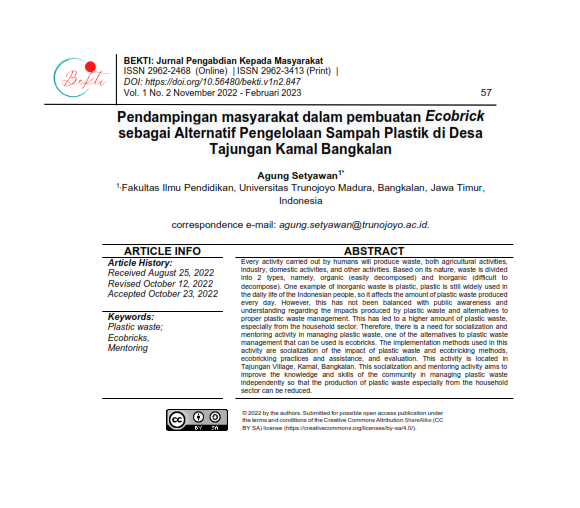Pendampingan masyarakat dalam pembuatan Ecobrick sebagai Alternatif Pengelolaan Sampah Plastik di Desa Tajungan Kamal Bangkalan
DOI:
https://doi.org/10.56480/bekti.v1i2.847Keywords:
Plastic waste, Ecobricks, MentoringAbstract
Every activity carried out by humans will produce waste, both agricultural activities, industry, domestic activities, and other activities. Based on its nature, waste is divided into 2 types, namely, organic (easily decomposed) and inorganic (difficult to decompose). One example of inorganic waste is plastic, plastic is still widely used in the daily life of the Indonesian people, so it affects the amount of plastic waste produced every day. However, this has not been balanced with public awareness and understanding regarding the impacts produced by plastic waste and alternatives to proper plastic waste management. This has led to a higher amount of plastic waste, especially from the household sector. Therefore, there is a need for socialization and mentoring activity in managing plastic waste, one of the alternatives to plastic waste management that can be used is ecobricks. The implementation methods used in this activity are socialization of the impact of plastic waste and ecobricking methods, ecobricking practices and assistance, and evaluation. This activity is located in Tajungan Village, Kamal, Bangkalan. This socialization and mentoring activity aims to improve the knowledge and skills of the community in managing plastic waste independently so that the production of plastic waste especially from the household sector can be reduced.
References
Andriastuti, B. T., Arifin, A., & Fitria, L. (2019). Potensi ecobrick Dalam mengurangi sampah plastik rumah tangga Di kecamatan pontianak barat. Jurnal Teknologi Lingkungan Lahan Basah, 7(2), 055-063.
Apriyani, A., Putri, M. M., & Wibowo, S. Y. (2020). Pemanfaatan sampah plastik menjadi ecobrick. Masyarakat Berdaya Dan Inovasi, 1(1), 48-50.
Astuti, H. K. (2022). Pemberdayaan ekonomi kreatif melalui Daur ulang sampah plastik (Studi kasus bank sampah kelurahan paju ponorogo).
Fauzi, M., Sumiarsih, E., Adriman, A., Rusliadi, R., & Hasibuan, I. F. (2020). Pemberdayaan masyarakat melalui pelatihan pembuatan ecobrick sebagai upaya mengurangi sampah plastik di Kecamatan Bunga Raya. Riau Journal of Empowerment, 3(2), 87-96.
Hafrida, L., & Alfani, M. H. (2020). Pengaruh Pembuatan Ecobrick Terhadap Tingkat Kepedulian Lingkungan pada STIE TN Dumai. Management Studies and Entrepreneurship Journal (MSEJ), 1(2), 127-132.
Hopkins, R. 2014. EcoBricks and education: how plastic bottle rubbish is helping build schools. https://www.theguardian.com/lifeandstyle/2014/may/29/ecobricks-and-education-how-plastic-bottle-rubbish-is-helping-build-schools, diakses tanggal 4 Juli 2022
Ikhsan, M., & Tonra, W. S. (2021). Pengenalan Ecobrick di Sekolah Sebagai Upaya Penanggulangan Masalah Sampah. PATIKALA: Jurnal Pengabdian Kepada Masyarakat, 1(1), 32-38.
Patil, A. A., Kulkarni, A. A., & Patil, B. B. 2014. Waste to Energy by Incineration. Journal of Computing Technologies, 3(6):12-15.
Septiani, B. A., Arianie, D. M., Risman, V. F. A. A., Handayani, W., & Kawuryan, I. S. S. (2019). Pengelolaan Sampah Plastik di Salatiga: Praktik dan Tantangan. Jurnal Ilmu Lingkungan, 17(1), 90-99.
Suminto, S. (2017). Ecobrick: solusi cerdas dan kreatif untuk mengatasi sampah plastik. Productum: Jurnal Desain Produk (Pengetahuan dan Perancangan Produk), 3(1), 26-34.
Syukur, M., Awaru, A. O. T., & Arifin, Z. (2019). Pemberdayaan istri nelayan Kelurahan Samataring melalui program daur ulang sampah plastik. In Seminar Nasional Pengabdian Kepada Masyarakat (Vol. 2019, No. 4).
Verma, R., Vinoda, K. S., Papireddy, M., & Gowda*, A. 2016. Toxic Pollutants from Plastic Waste-A Review. rocedia Environmental Sciences, 35: 701-708.
Yusiyaka, R. A., & Yanti, A. D. (2021). Ecobrick: Solusi Cerdas Dan Praktis Untuk Pengelolaan Sampah Plastik. Learning Community: Jurnal Pendidikan Luar Sekolah, 5(2), 68-74.

Downloads
Published
Issue
Section
License
Copyright Notice
Authors who publish with this journal agree to the following terms:
- Authors retain copyright and grant the journal right of first publication with the work simultaneously licensed under a Creative Commons Attribution-ShareAlike 4.0 International License that allows others to share the work with an acknowledgment of the work's authorship and initial publication in this journal.
- Authors are able to enter into separate, additional contractual arrangements for the non-exclusive distribution of the journal's published version of the work (e.g., post it to an institutional repository or publish it in a book), with an acknowledgment of its initial publication in this journal.
- Authors are permitted and encouraged to post their work online (e.g., in institutional repositories or on their website) prior to and during the submission process, as it can lead to productive exchanges, as well as earlier and greater citation of published work (See The Effect of Open Access).

This work is licensed under a Creative Commons Attribution-ShareAlike 4.0 International License.











